|
|
|
Sort Order |
|
|
|
Items / Page
|
|
|
|
|
|
|
| Srl | Item |
| 1 |
ID:
120444
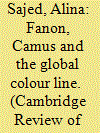

|
|
|
|
|
| Publication |
2013.
|
| Summary/Abstract |
I focus here on the political stances of Frantz Fanon and Albert Camus regarding the Algerian War of Independence. By examining their reflections on this violent anticolonial struggle, I seek to highlight the role of colonial difference and of racial hierarchies in the constitution of global politics. Fanon's position relies on an ethos of decolonization and on an ethics of difference that-while specific to the Algerian context-also reverberated profoundly among other societies caught in the violence of imperial encounters. Camus' conciliatory approach, however, and his moral equalization of the violence perpetrated by both sides enunciate the inherent racial hierarchies underpinning liberal narratives. I argue that the limits inherent in Fanon's thought-but also its latent potentialities for decolonial thinking-become apparent when examined through the lens of the contemporary activism among North African migrants and their descendants in France. The emergence of self-proclaimed decolonial movements constitutes an attempt to enact a decolonial transnational citizenship, which contests the racial boundaries of French Republicanism. But it also signals a different vision of the universal-one that is entrenched in a terrain of historical specificity and which holds more promise in contesting the global colour line.
|
|
|
|
|
|
|
|
|
|
|
|
|
|
|
|
| 2 |
ID:
093700
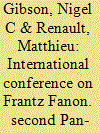

|
|
|
|
|
| Publication |
2009.
|
| Summary/Abstract |
A two-day conference on Frantz Fanon was held as part a second Pan-African Cultural Festival in Algiers in July 2009. The conference was hosted in the National Library of Algeria and organized by the National Center of Prehistoric, Anthropological and Historical Research (CNRPAH).
|
|
|
|
|
|
|
|
|
|
|
|
|
|
|
|
| 3 |
ID:
152124
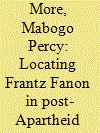

|
|
|
|
|
| Summary/Abstract |
There is a huge re-emergence of Frantz Fanon’s ideas and an equally huge interest in his work in post-apartheid South Africa, both in the academy and social movement and organizations. Contrary to some commentators, particularly his biographers, this article aims to locate Fanon within the South African struggle for liberation. It is argued here that Fanon, throughout his life, as evidenced by his writings, was highly concerned about apartheid just as he was about French Algerian colonialism. For him, the paper claims, apartheid was synonymous with colonialism and therefore his critique of colonialism was just as much a critique of apartheid. The resurgence of his name and ideas in the country is a consequence of this critique.
|
|
|
|
|
|
|
|
|
|
|
|
|
|
|
|
| 4 |
ID:
142614
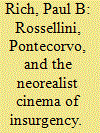

|
|
|
|
|
| Summary/Abstract |
This article examines the tradition of Italian neorealism and the importance it has for films depicting guerrilla insurgencies. It looks in particular at the two films by Roberto Rossellini Rome Open City and Paisa as well as the later film by Nanni Loy Four Days in Naples. It then proceeds to locate Gillo Pontecorvo's iconic film The Battle of Algiers within this neorealist tradition and examines the degree to which the director succeeded in continuing the basic traditions of neorealism into the context of the Algerian war of Independence. The article concludes that while this film remains of great interest it should be situated in the period when it was produced and is in many ways radically disconnected from many insurgent movements of the present day.
|
|
|
|
|
|
|
|
|
|
|
|
|
|
|
|
| 5 |
ID:
117768
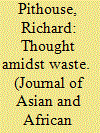

|
|
|
|
|
| Publication |
2012.
|
| Summary/Abstract |
This paper begins by noting that some forms of leftism reinforce rather than oppose the exclusion of the urban poor from the agora. It shows that neither the capacity for intellectual nor for ethical seriousness can be read off a sociological location and suggests that a humanism made, in Cesaire's terms, 'to the measure of the world', a commitment to a universal ethic, is necessary if the humanity, and therefore the prospect of political agency, on the part of all people is to be recognized. It concludes by arguing that recent debates about a return to a communist Idea need to be mindful of a history in which communism has been a form of imperialism rather than a genuinely universal ideal.
|
|
|
|
|
|
|
|
|
|
|
|
|
|
|
|
| 6 |
ID:
146001
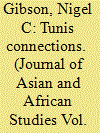

|
|
|
|
|
| Summary/Abstract |
Reflecting on Contested Terrains and Constructed Categories: Contemporary Africa in Focus, a book George Bond and I edited during our work at the Institute of African Studies at Columbia University in the late 1990s, this paper considers the notion of contested terrains, that for George Bond was played out in the scholarship of African studies, in the daily encounters which he had with his colleagues, and in his Zambian research. Bond understood these contestations as continuously operating on and across and often taking place below the surface or at the margins of insititutions. This paper emerged in response to Bond’s invitation to speak about Fanon’s psychiatry writings and Fanon’s critique of sociotherapy on a panel he was organizing at the American Anthropological Association in 2014 (AAA). After he died, the focus shifted to include Bond alongside Fanon and Foucault underscoring the continued need for dialog on the work of three intellectuals—African-American, African Caribbean, and French. The connections and misconnections between Fanon and Foucault is in part the discussion about contested terrains and the willfulness of constructed categories. Indeed, intellectual genealogies, the unknown connections as well as dividing lines was something that interested Bond, the anthrolopologist of the politics of knowledge.
|
|
|
|
|
|
|
|
|
|
|
|
|
|
|
|
|
|
|
|
|